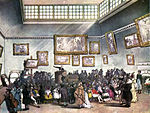This article may be too technical for most readers to understand. (January 2020) |
This article may lend undue weight to auctions and matching, which have their own Wikipedia pages, making the material redundant. (June 2024) |
Market design is an interdisciplinary,[1] engineering-driven[2] approach to economics and a practical methodology for creation of markets of certain properties, which is partially based on mechanism design.[3] In market design, the focus is on the rules of exchange, meaning who gets allocated what and by what procedure. Market design is concerned with the workings of particular markets in order to fix them when they are broken or to build markets when they are missing.[4] Practical applications of market design theory has included labor market matching (e.g. the national residency match program), organ transplantation, school choice, university admissions, and more.
- ^ [Milgrom Nemmers Prize Presentation Slides, 2008] Archived 2014-02-20 at the Wayback Machine
- ^ Roth, Alvin E. "The economist as engineer: Game theory, experimentation, and computation as tools for design economics." Econometrica 70.4 (2002): 1341-1378.
- ^ Roth, Alvin E.; Wilson, Robert B. (Summer 2019). "How Market Design Emerged from Game Theory: A Mutual Interview". Journal of Economic Perspectives. 33 (3): 118–143. doi:10.1257/jep.33.3.118. ISSN 0895-3309.
- ^ Alvin Roth (2007), The Art of Designing Markets, Harvard Business Review, https://hbr.org/2007/10/the-art-of-designing-markets
